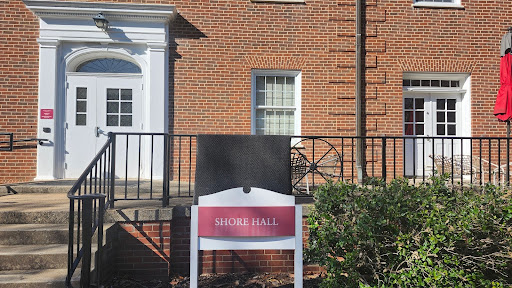A student’s desk covered with detention slips. Portraits of scowling teachers and students. A game board for a game that cannot be won.
All these pieces reveal different facets of one narrative in the words of those most affected: forcing North Carolina’s minority youth out of school and into the criminal justice system.
This trend, known as the “school-to-prison pipeline,” is the topic of the art exhibit “None of the Above: Dismantling the School-to-Prison Pipeline,” created by the Durham-based organization Hidden Voices. Installed in the West Gallery of Founders Hall on Feb. 10, “None of the Above” is a multimedia, interactive gallery installation.
“(The exhibit) educates students about poverty, race, education and incarceration — it covers a huge swath of issues,” Lynden Harris, director of Hidden Voices, told The Guilfordian in a phone interview.
While “None of the Above” includes more traditional, wall-mounted art, it also incorporates some less conventional installations. One such piece, a desk with the word “boring” scrawled across the top, holds an MP3 player containing the reflections of students and teachers. Another table displays two View-Master toys that present information at the pull of a lever.
First-year Iain Parrott described the piece that most caught his attention: a desk with an American flag painted with brown and white stripes, each stripe containing a different sentence.
“For the white, there was a poem, and for the brown there was a (different) poem,” said Parrott. “(It was) a really good representation of the differences between the communities.”
For the exhibit’s opening reception on Feb. 20, community members gathered to hear 19 monologues read aloud by Guilford College students, faculty, staff and alumni, along with members of the broader community. The monologues were adapted from oral histories collected by Hidden Voices and Guilford students.
Senior Phyllis Campbell, who was interviewed for one of the monologues, encouraged everyone to attend the opening reception.
“This stuff is someone’s actual life story; that’s what I like about (Harris),” Campbell said in a phone interview.
Although the exhibit only covers North Carolina, the pipeline is a national issue.
“The school-to-prison pipeline is very troubling … because this system is created by private corporations who stand to benefit financially from the incarceration of young people of color,” Jorge Zeballos, director of diversity training and development, said in an email interview.
The pipeline has only become more troubling since the introduction of “zero tolerance” laws in schools, which cause students to be suspended or criminally prosecuted for relatively minor infractions.
“Even elementary school children get handcuffed for things they’ve done,” said Sherry Giles, associate professor and chair of the justice and policy studies department.
The exhibit will be on display through March 6.
Giles, who is a co-sponsor of the exhibit, hopes that “None of the Above” will spark more community involvement.
“I think that as a state, as a city, we really need to focus on these issues, and colleges and students and faculty can be important people in that process of trying to create a change,” said Giles. “I’m hopeful for the exhibit contributing to that.”












